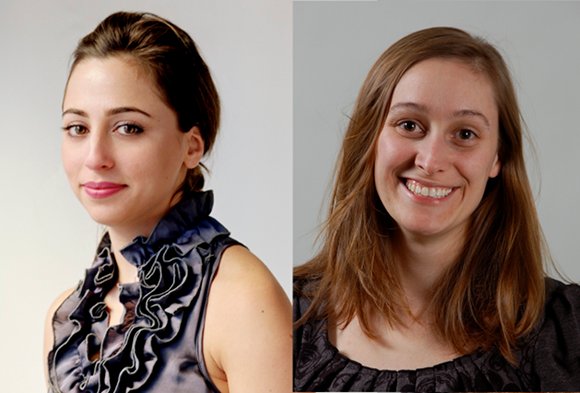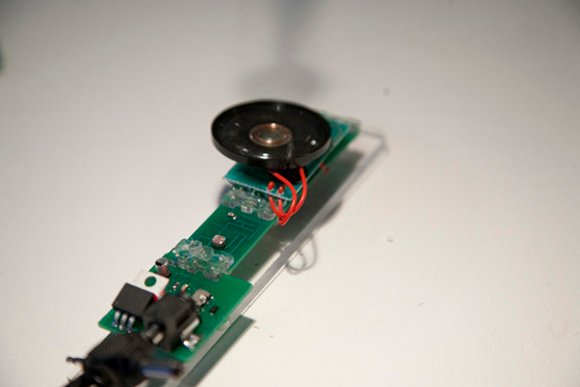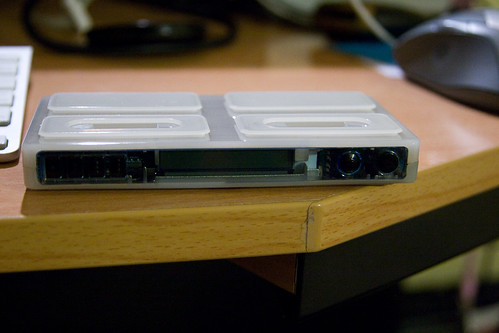
Open source software has proven itself in technological, economic, and cultural terms – it’s simply a matter of reality. This site runs atop free software nginx, WordPress, MySQL, and (Red Hat Enterprise) Linux; in music, we have Csound, SuperCollider, Pd, Ardour, JACK, Processing, and so on. Csound has even appeared on karaoke machines. These tools run alongside and interoperate with commercial, closed-source solutions. They’re a part of our technological ecosystem, both in general-purpose computing and in music and visuals.
But what about hardware? Facing scarcity and fabrication, hardware combines all of the challenges of software with new problems. And unlike software, open source hardware lacks clear licenses and definitions.
There’s clearly a role open source hardware could play in music. There are already components, like USB chipsets, that are available in open source form that can benefit music projects. And while true open source hardware has been rare or available only in limited runs, there have been hardware projects with open source components. Most notably, the fully open source software that powers the monome has been instrumental in facilitating the passionate community around that device. Here’s what the monome project proclaims on its official site:
we believe that open source is commercially viable and mutually beneficial for our collective and the consumer. in opening our software we eliminate wasteful, redundant coding for ourselves by incorporating proven libraries and frameworks. we in turn provide these same benefits to others who wish to incorporate our development efforts into their projects. we believe distributed development leads to more stable software and more creative application design. we believe open applications provide more flexibility for users to adapt tools to their specific needs, encourage creative use of software and hardware, and produce a greater diversity output from users.
But even given the monome manifesto above, music gear embracing open source hardware has been relatively scarce – even more so if you apply the definition adopted by many advocates. (The monome, for its part, would not meet a number of the criteria of open source hardware drafted for the summit.)
This Thursday in New York, on the eve of Maker Faire, the Open Hardware Summit promises to break new ground. It features a packed schedule of thinkers from NASA to Texas Instruments to the Arduino project, and the introduction of a first working definition of open source hardware.
I spoke to project co-chairs Alicia Gibb and Ayah Bdeir about the origins and goals of the event, and some of the unique challenges of doing open source hardware.
At the same time, I couldn’t help but notice the absence of music and audio figures on the program. That to me suggests that this discussion is not less relevant, but more so – if there is a disconnect between musical creators working with these ideas and the rest of the community, it’s worth exploring why that is, given that musical expression is such a fundamental part of our culture. More on that at the end, as we don’t yet have a good catalog of active, available projects for open source music.

CDM: Can you tell us how this project, and the Summit, came about?
Alicia: About 7 months ago, in January Peter [Semmelhack, of BUG Labs] said to me, “Hey, I’ve been getting a lot of people from hardware companies calling me and asking for advice. We have learned a lot of lessons in producing hardware and others shouldn’t have to make those same mistakes. Is there a way we could get all kinds of people who work with open source hardware together and all share information, a conference or summit – like an Open Hardware Summit or something.” And I replied to him – “Peter, this is going to be epic, consider it done.” I began working and thinking of key players to involve on this Open Hardware Summit.
Separately, in March, Ayah brought many excellent minds together at the Opening Hardware Workshop sponsored by Eyebeam and CC, it was such an impressive collection, to begin forming a definition of what open source hardware entails. (In the first video on the Eyebeam project site, Ayah explains a bit about how that event was brought together.) The definition that you have come across is the definition that was spurred from that workshop. It was there that I began talking to a couple people about the conference and Chris Anderson [Wired] said “Have you thought about doing it around … Maker Faire?”
Sherry Huss, Dale Dougherty and Becky Stern [all of Make] all sat down to chat with me and loved the idea of having it the day before Maker Faire, they invited me along to scope out the space and treated me as family. They got NYSCI on board as our venue sponsor for the New York Hall of Science. They were absolutely instrumental in getting the Summit off the ground. Ayah mentioned that with her new fellowship at Creative Commons, one of the things they wanted to do was a conference around Open Hardware. Becky told her she should come talk to me – and really, the rest is history 🙂
I do have to say it is such an honor to plan this with Ayah, I read her work as a grad student and as Peter texted me after our first meeting with all the key players in the Summit, “I think the fact that the first Open Hardware Summit is being chaired by women is a terrific signal”. I feel very fortunate to have a job that allows me to make my dreams happen, and CEO who truly has his heart in the right place when it comes to open source. Peter’s ability to be a successful business man while not forgetting the importance of sharing, giving back, and maintaining transparency in open source projects has been inspirational to me.
Ayah and I are the co-chairs of the Summit. However as we plan more and more we hope to bring on other volunteers for help. The other key players that we consider catalysts to this event are: Bug Labs, Creative Commons, littleBits, MAKE, Maker Faire, NYSCI, and Eyebeam.
littleBits intro from ayah bdeir on Vimeo.
Ayah, can you talk a little about your background in this, particularly since Opening Hardware was a project you created at Eyebeam?
Ayah: From my end, i have been working on Open hardware for my own project littleBits (www.littleBits.cc) with advisor John Wilbanks of Creative Commons for a while. Our talks were so interesting that we decided to host a small workshop in March where we would invited interested hardware makers and have a discussion between the open hardware community and creative commons to better understand the issues and licensing options. In the workshop we saw that a license would not be the way to go but rather a community-approved set of norms or definition might work best. Ed.: As noted in comments, littleBits is not yet available for purchase, but “design files, schematics and instructions will be online when we are done manufacturing.” -PK
Who is actively involved in that community effort?
Ayah: The Opening Hardware workshop was organized by me, with eyebeam, ted ullrich and celine assaf, and sponsored by CC. we then set up a mailing list and hosted discussions on the definition, where a bunch of us were actively involved in the drafting (dave mellis prodding people to hash out the version 0.1 draft and Windell did most of the writing for the current (0.3) draft (adopting from the DFSG and the OSI OSS definition)). Although lots of people contributed both comments and text including: Arduino, Adafruit, Buglabs, MakerBot, Chumby as well as Jonathan Kuniholm (Open Prosthetics), Chris Anderson (Wired), Mako Hill (OLPC, Wikipedia), Jon Philips (Qi), Shigeru Kobayashi (Gainer), Becky Stern (Make) and Thinh Nguyen and John Wilbanks (CC) and us (littleBits, Eyebeam), Parallax, Sparkfun, Lilypad.
What drove this effort; what made it come about?
It seemed like so many of us that were interested in porting the open source movement to hardware were struggling with adapting it, and its restrictions and specificities. We believe it is such a worthwile movement to fuel creativity in the world that we really wanted to share it with others.
The most common question I hear asked is by creators, who are concerned that people will simply set up cheap manufacture to clone products, undercutting costs and reducing their ability to invest in support and further development. Is there anything in this definition that would protect against this?
Ayah: From David Mellis, Arduino:
I think the best strategy is to provide good products at a reasonable price, offer good customer service, and establish a brand that people trust. We do mention in the introduction that you can’t imply your products are supported or or sanctioned by another manufacture or use someone else’s trademarks – both intended to help protect a company’s brand and reputation.
Ed.: Okay, there’s quite a lot more to discuss here, I know – so consider this the beginning of this conversation, not the end. I think what David suggests is one compelling answer, but I hope we do have a larger discussion of the issues here, as this a significantly multi-dimensional question. -PK
What’s essential to this definition in your view and what’s up for discussion? For instance, some (though not all) makers believe that some sort of non-commercial
restriction is needed to prevent cloning, but that’s explicitly forbidden in this draft. Is it possible that a future definition might include other tiers, like Creative Commons’ non-commercial license for creative works? Or is that anathema to the definition of open source hardware?
Ayah: We’re trying to define open-source hardware (not create a license). We mostly think non-commercial clauses are antithesis to open source. However, some want a really idealistic application for open source to hardware, but others, (like me) think it’s ok if different companies and individuals have different flavors so that the movement can gain the most traction and people can find their own ways to be sustainable.
What will the role of the hardware summit be?
Ayah: The summit will be a venue to share and discuss issues, problems and solutions in open hardware. This is also an opportunity for us to bring Creative Commons into the discussion with the community.
There will be a very deliberate attempt to remain practical and not too academic/theoretical, and we want to get work done in terms of the movement. We are also hoping to get more comments before the summit and be able to release version 1.0 of the definition to the world!
Where does Creative Commons fit in?
Ayah: CC committed, albeit in an early stage to support the open hardware movement, which can be seen by their awarding me of a fellowship to support the field and focus on open hardware. Even if it will not be throught creating licenses for us, they are interested in being involved in the discussion, and have been very generous supporters.
Are there any usable license models now that someone could look at? Definitions aside, is there a sense of best-practices for someone who has a hardware design now and wants to take the plunge?
Ayah: Again, from David Mellis:
I would recommend people share whatever they feel comfortable with. Open-source hardware doesn’t make sense for all companies or all products, and everyone should decide what makes sense for their own situation. On the other hand, we believe in the value of open-source as applied to hardware in the ways stated in the definition, and so we would encourage its use where possible.
If people want to get involved in the discussion, what’s he best way to do that?
www.openhardwaresummit.org/forum
What are some of the highlights of what you have scheduled for Thursday? What can people expect to hear?
Everything is a highlight for Thursday! The response and interest to the summit has been so incredible that we really tried to pack the best in. The panels are particularly going to be interesting, with such great participants from various fields, we expect to get lots of great questions and answers.
TOne of our most important goals for the Summit is to keep the event very action-driven and solution-driven. This means talking about best practices, advice on how to better make open hardware, and staying away from the theoretical jargon and bikeshedding. We expect there to be a lot of young makers and companies starting out in open hardware, so the more specific/real-world experiences and advice we can give them the better! Another particular highlight we are selfishly hoping for is to hash out the Open Hardware definition and take it from version 0.3 to version 1.0!
Since we’re talking to a music/sound (and on motion, visual) audience, anything likely to be specifically relevant to them?
The sprint talks will be specifically interesting to them. The speakers are showing their projects, in space research, art, design and education. We think it will be particularly interesting eye candy for your audience, as well as have a lot of value in terms of relating to the speakers and the problems/opportunities they face with their work.
(CDM) Call for Open Source Music Hardware
My read of the situation is that this is the beginning (or even a prelude) rather than the end of the story. So that means, since there really isn’t much, if any, representation of audio and music platforms at the summit (unless you count Arduino, or a possible cameo by a x0xb0x), maybe it’s time to do a tally of those platforms.
What projects do you consider “open source hardware” for music? Are there any you’ve seen recently, or use actively?
What would you want in an open source hardware platform?
And do you have a project you’ve considered for an open source license yourself?
I’ve actually seen a few projects recently that I’m excited about, either available now or coming soon, so I’ll be covering those, but at the risk of proposing a list that’s incomplete, I’ll leave them out for now and listen to what you think.
The Summit…
http://www.openhardwaresummit.org/

